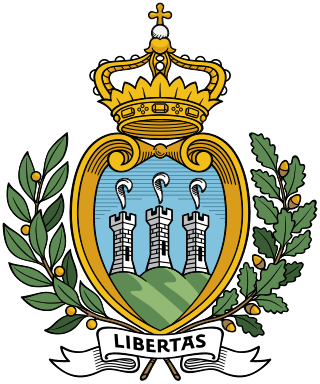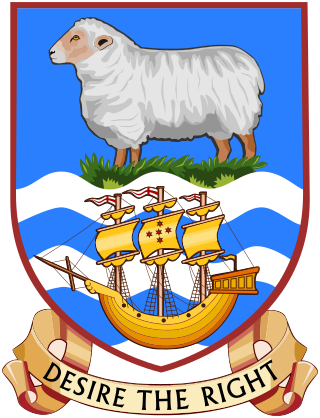
Plurality voting refers to electoral systems in which the candidates in an electoral district who poll more than any other are elected.
Norway elects its legislature on a national level. The parliament, the Storting, has 169 members elected for a four-year term by a form of proportional representation in multi-seat constituencies.

In political science, parallel voting or superposition refers to the use of two or more electoral systems to elect different members of a legislature. More precisely, an electoral system is a superposition if it is a mixture of at least two tiers, which do not interact with each other in any way; one part of a legislature is elected using one method, while another part is elected using a different method, with all voters participating in both. Thus, the final results can be found by calculating the results for each system separately based on the votes alone, then adding them together. A system is called fusion or majority bonus, another independent mixture of two system but without two tiers. Superposition is also not the same as "coexistence", which when different districts in the same election use different systems. Superposition, fusion and coexistence are distinct from dependent mixed electoral systems like compensatory (corrective) and conditional systems.
Canada holds elections for legislatures or governments in several jurisdictions: for the federal (national) government, provincial and territorial governments, and municipal governments. Elections are also held for self-governing First Nations and for many other public and private organizations including corporations and trade unions. Municipal elections can also be held for both upper-tier and lower-tier governments.

Elections in Chile are held nationwide, including the presidency, parliament, regional offices, and municipal positions. Chilean citizens and foreign residents with legal residency of at least five years, who are 18 years or older on election day, are eligible to vote. Previously, voting was voluntary, but since 2023, it has become compulsory.
Regular elections in Croatia are mandated by the Constitution and legislation enacted by Parliament. The presidency, Parliament, county prefects and assemblies, city and town mayors, and city and municipal councils are all elective offices. Since 1990, seven presidential elections have been held. During the same period, ten parliamentary elections were also held. In addition, there were nine nationwide local elections. Croatia has also held three elections to elect members of the European Parliament following its accession to the EU on 1 July 2013.

France is a unitary semi-presidential republic with a bicameral legislature. Public officials in the legislative and executive branches are either elected by the citizens or appointed by elected officials. Referenda may also be called to consult the French citizenry directly on a particular question, especially one which concerns amendment to the Constitution.

A referendum, in the Italian legal system is a request directed to the whole electorate to express their view on a determined question. It is the main instrument of direct democracy in Italy.

Elections in Benin take place within the framework of a multi-party democracy and a presidential system. Both the President and the National Assembly are directly elected by voters, with elections organised by the Autonomous National Electoral Commission (CENA).

Elections in Lithuania are held to select members of the parliament, the president, members of the municipal councils and mayors, as well as delegates to the European Parliament. Lithuanian citizens can also vote in mandatory or consultative referendums.
BC-STV is the proposed voting system recommended by the Citizens' Assembly on Electoral Reform in October 2004 for use in British Columbia, and belongs to the single transferable vote family of voting systems. BC-STV was supported by a majority of the voters in a referendum held in 2005 but the government had legislated that it would not be bound by any vote lower than 60 percent in favour. Because of the strong majority support for BC-STV, the government elected to stage a second referendum in 2009, but with increased public funding for information campaigns to better inform the electorate about the differences between the existing and proposed systems. The leadership of both the "yes" side and the "no" side were assigned by the government. The proposal was rejected with 60.9 percent voting against, vs. 39.1 percent in favour, in the 2009 vote.
There are five types of elections in the United Kingdom: elections to the House of Commons of the United Kingdom, elections to devolved parliaments and assemblies, local elections, mayoral elections, and Police and Crime Commissioner elections. Within each of those categories, there may also be by-elections. Elections are held on Election Day, which is conventionally a Thursday, and under the provisions of the Dissolution and Calling of Parliament Act 2022 the timing of general elections can be held at the discretion of the prime minister during any five-year period. All other types of elections are held after fixed periods, though early elections to the devolved assemblies and parliaments can occur in certain situations. The five electoral systems used are: the single member plurality system (first-past-the-post), the multi-member plurality, the single transferable vote, the additional member system, and the supplementary vote.

The United Kingdom Alternative Vote referendum, also known as the UK-wide referendum on the Parliamentary voting system was held on Thursday 5 May 2011 in the United Kingdom to choose the method of electing MPs at subsequent general elections. It occurred as a provision of the Conservative–Liberal Democrat coalition agreement drawn up in 2010 and also indirectly in the aftermath of the 2009 expenses scandal. It operated under the provisions of the Parliamentary Voting System and Constituencies Act 2011 and was the first national referendum to be held under provisions laid out in the Political Parties, Elections and Referendums Act 2000. Many local elections were also held on this day.

General elections were held in Belize on 7 March 2012 to elect all 31 members of the Belize House of Representatives as well as offices in the various local governments. The election was run by the Elections and Boundaries Commission's Elections and Boundaries Department. Dean Barrow and his United Democratic Party (UDP) were re-elected, but lost eight seats to the opposition People's United Party (PUP) to maintain a slim 17-14 majority in the Belize House. The upper house of the Belize National Assembly, the Senate, was appointed after the election by the UDP-led government in accordance with the Constitution of Belize.

General elections were held in the Cayman Islands on 22 May 2013. The incumbent United Democratic Party (UDP) government fell on a motion of non-confidence in December 2012 and was replaced by an interim government made up of former UDP members who formed the People's National Alliance (PNA). The main competition in the election was between the People's Progressive Movement (Progressives) and the UDP, with the PNA and a new political group the Coalition for Cayman (C4C) presenting an insufficient number of candidates to win a majority government.
A referendum on the archive law was held in Slovenia on 8 June 2014. Voters were asked whether they were in favor of the amendments to the law that were passed in January 2014. The amendments were rejected by 67% of voters, although the referendum was invalidated by "no" voters accounting for only 7.79% of all registered voters, well below the 20% quorum.

Four referendums were held in San Marino on 15 May 2016. Three of the four proposals were approved, with the repeal of law 137 rejected.
A referendum on electoral reform was held on 10 October 2018 in Guernsey to determine an electoral system for elections to the States of Guernsey. Voters were asked to rank five different proposed electoral systems, with a run-off system used to determine the winning proposal. Option A, a 38-member constituency covering the whole island, won the vote. As a result of voter turnout (45%) being above the 40% vote threshold, the referendum was binding.

A referendum on reforming the electoral system was held in the Falkland Islands on 24 September 2020, after being postponed from 26 March 2020 following the Coronavirus pandemic. Voters were asked if they wanted to replace the two existing electoral constituencies with a single constituency for the whole of the Islands. Although a majority of those who voted supported the change, the required two-thirds majority in both of the islands' constituencies was not achieved.

Parliamentary elections were held in the Federated States of Micronesia on 5 March 2019, alongside a referendum on calling a Constitutional Convention. All 14 seats in Congress were up for election, and all 13 incumbents standing for re-election were returned to Congress.













